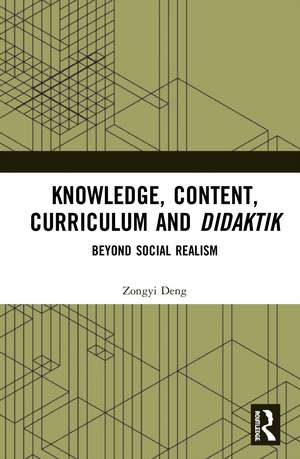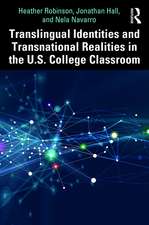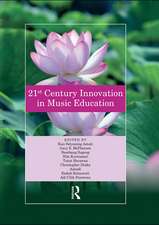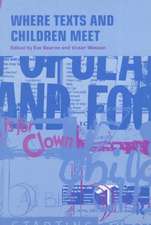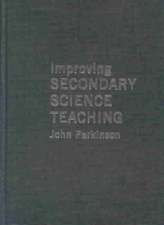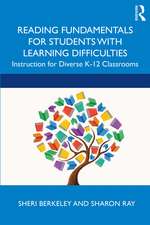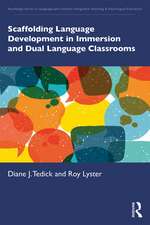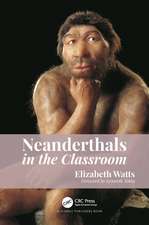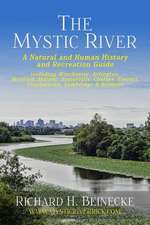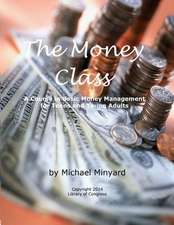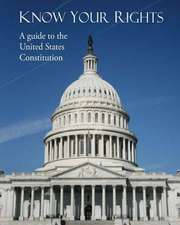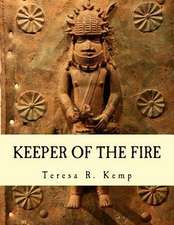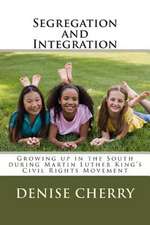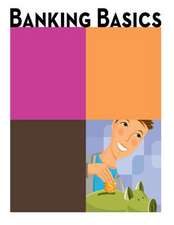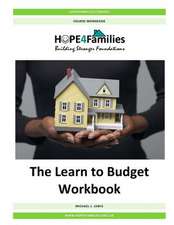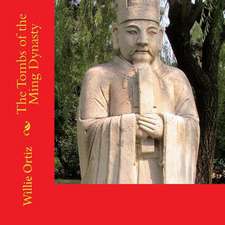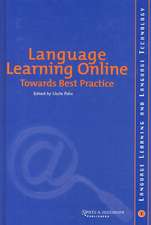Knowledge, Content, Curriculum and Didaktik: Beyond Social Realism
Autor Zongyi Dengen Limba Engleză Hardback – 28 apr 2020
- Educational aims and theories of knowledge
- School subjects and academic disciplines: differences and relationships
- School subjects and theories of content
- Understanding the content for teaching
| Toate formatele și edițiile | Preț | Express |
|---|---|---|
| Paperback (1) | 303.87 lei 6-8 săpt. | |
| Taylor & Francis – 29 apr 2022 | 303.87 lei 6-8 săpt. | |
| Hardback (1) | 996.33 lei 6-8 săpt. | |
| Taylor & Francis – 28 apr 2020 | 996.33 lei 6-8 săpt. |
Preț: 996.33 lei
Preț vechi: 1215.04 lei
-18% Nou
Puncte Express: 1494
Preț estimativ în valută:
190.65€ • 199.46$ • 158.37£
190.65€ • 199.46$ • 158.37£
Carte tipărită la comandă
Livrare economică 02-16 aprilie
Preluare comenzi: 021 569.72.76
Specificații
ISBN-13: 9780815360193
ISBN-10: 0815360193
Pagini: 112
Dimensiuni: 156 x 234 x 13 mm
Greutate: 0.34 kg
Ediția:1
Editura: Taylor & Francis
Colecția Routledge
Locul publicării:Oxford, United Kingdom
ISBN-10: 0815360193
Pagini: 112
Dimensiuni: 156 x 234 x 13 mm
Greutate: 0.34 kg
Ediția:1
Editura: Taylor & Francis
Colecția Routledge
Locul publicării:Oxford, United Kingdom
Public țintă
PostgraduateCuprins
Acknowledgments Preface 1. Introduction 2. Knowledge, disciplinarity and postmodern critiques 3. Aims of schooling, school subjects and knowledge questions 4. Liberal education, Bildung and theory of knowledge 5. Liberal education, Bildung and theory of content 6. Rethinking teaching and teachers: bringing content back into conversation 7. Pedagogical content knowledge reconceived: bringing curriculum thinking into conversation on teachers' understanding of content 8. Conclusion: beyond social realism Index
Notă biografică
Zongyi Deng is Professor of Curriculum and Pedagogy at the UCL Institute of Education, University College London. He is also an executive editor of the Journal of Curriculum Studies (JCS) and has held faculty positions at Nanyang Technological University and the University of Hong Kong. His interest areas include curriculum content or subject matter, curriculum theory, didactics (Didaktik), curriculum policy and reform, and comparative and international education. His publications appear in JCS, Curriculum Inquiry, Comparative Education, Teaching and Teacher Education, Teachers and Teaching, Cambridge Journal of Education, Science Education and other international journals. Edited books include Re-envisioning Chinese Education: The Meaning of Person-Making in a New Age (with Guoping Zhao; 2015) and Globalization and the Singapore Curriculum: From Policy to Classroom (with S. Gopinathan and Christine Lee; 2013).
Recenzii
‘There is no book that covers the same territory around curricula and teaching as Knowledge, Content, Curriculum and Didaktik. Deng draws on a wide variety of contemporary and classical English-language resources as well as less well-knownn the English-speaking world -- but very important German-language resources. I believe Deng’s book constitutes a fundamental resource for discussions of both practical curriculum-making and teaching and educational and curriculum theory. Knowledge, Content, Curriculum and Didaktik will be a basic text wherever curricula and teaching are thought about and studied.’ - Ian Westbury, Emeritus Professor of Curriculum Studies, University of Illinois at Urbana-Champaign, USA
‘This is a welcome and ambitious book which challenges those who work in the field of curriculum studies, as well as the sociologists of education who have tried to reform it. The author’s advice to the former is that not only are there lessons to be learned from the sociologists concerning the neglect by mainstream curriculum studies of the question of knowledge and its acquisition, but that they need to extend their over-parochial focus and learn lessons from Europe and beyond, especially the German Didaktic tradition. The author’s recommendations for the sociologists is that they too have to look beyond their discipline if they are to have the influence that they seek on what happens in classrooms.’ - Michael Young, Professor of Sociology of Curriculum, UCL Institute of Education, London, UK
‘Some school leaders appear to see teaching as merely an instrumental ‘factor’ contributing to school performance, with the curriculum crisis being fixable by the provision of scripted lessons. This book comes as a relief therefore. Deng not only rebalances curriculum thought towards a meaningful focus on knowledge questions but roams lucidly over related fields with a truly international perspective. This book is weighty, thorough and very stimulating in its analysis. It should provide a foundation and reference point for those interested in the quality of education for years to come. It is forward facing and provides theoretical heft to the vision offered by the creation of Future 3 curriculum scenarios as an alternative to ‘twenty-first century competence’. In the broader context of ‘post truth’, alternative facts and the existential challenges of the Anthropocene, society requires a serious educational response. This book contributes to that.’ - David Lambert, Emeritus Professor of Geography Education, UCL Institute of Education, London, UK
‘There is no book that covers the same territory around curricula and teaching as Knowledge, Content, Curriculum and Didaktik. Deng draws on a wide variety of contemporary and classical English-language resources as well as less well-knownn the English-speaking world -- but very important German-language resources. I believe Deng’s book constitutes a fundamental resource for discussions of both practical curriculum-making and teaching and educational and curriculum theory. Knowledge, Content, Curriculum and Didaktik will be a basic text wherever curricula and teaching are thought about and studied.’ - Ian Westbury, Emeritus Professor of Curriculum Studies, University of Illinois at Urbana-Champaign, USA
'This book’s primary argument that questions of knowledge are central to curriculum is ancient but mostly ignored, even denigrated, in contemporary English-speaking literature. The originality of Deng’s take on these questions flows from his global experience and ability to cross-cultural lines to draw out the best in different traditions. He was educated in mainland China, studied in the USA, worked in Singapore and Hong Kong, and currently teaches in England. He knows and understands Asian, European and North American curricular traditions and has studied the best offered by each. There is no other book on curriculum with this rich intellectual history.' - Mick Connelly, Emeritus Professor of Curriculum, Teaching and Learning, Ontario Institute for Studies in Education, University of Toronto, Canada
‘This is a welcome and ambitious book which challenges those who work in the field of curriculum studies, as well as the sociologists of education who have tried to reform it. The author’s advice to the former is that not only are there lessons to be learned from the sociologists concerning the neglect by mainstream curriculum studies of the question of knowledge and its acquisition, but that they need to extend their over-parochial focus and learn lessons from Europe and beyond, especially the German Didaktic tradition. The author’s recommendations for the sociologists is that they too have to look beyond their discipline if they are to have the influence that they seek on what happens in classrooms.’ - Michael Young, Professor of Sociology of Curriculum, UCL Institute of Education, London, UK
‘Some school leaders appear to see teaching as merely an instrumental ‘factor’ contributing to school performance, with the curriculum crisis being fixable by the provision of scripted lessons. This book comes as a relief therefore. Deng not only rebalances curriculum thought towards a meaningful focus on knowledge questions but roams lucidly over related fields with a truly international perspective. This book is weighty, thorough and very stimulating in its analysis. It should provide a foundation and reference point for those interested in the quality of education for years to come. It is forward facing and provides theoretical heft to the vision offered by the creation of Future 3 curriculum scenarios as an alternative to ‘twenty-first century competence’. In the broader context of ‘post truth’, alternative facts and the existential challenges of the Anthropocene, society requires a serious educational response. This book contributes to that.’ - David Lambert, Emeritus Professor of Geography Education, UCL Institute of Education, London, UK
‘This is a welcome and ambitious book which challenges those who work in the field of curriculum studies, as well as the sociologists of education who have tried to reform it. The author’s advice to the former is that not only are there lessons to be learned from the sociologists concerning the neglect by mainstream curriculum studies of the question of knowledge and its acquisition, but that they need to extend their over-parochial focus and learn lessons from Europe and beyond, especially the German Didaktic tradition. The author’s recommendations for the sociologists is that they too have to look beyond their discipline if they are to have the influence that they seek on what happens in classrooms.’ - Michael Young, Professor of Sociology of Curriculum, UCL Institute of Education, London, UK
‘Some school leaders appear to see teaching as merely an instrumental ‘factor’ contributing to school performance, with the curriculum crisis being fixable by the provision of scripted lessons. This book comes as a relief therefore. Deng not only rebalances curriculum thought towards a meaningful focus on knowledge questions but roams lucidly over related fields with a truly international perspective. This book is weighty, thorough and very stimulating in its analysis. It should provide a foundation and reference point for those interested in the quality of education for years to come. It is forward facing and provides theoretical heft to the vision offered by the creation of Future 3 curriculum scenarios as an alternative to ‘twenty-first century competence’. In the broader context of ‘post truth’, alternative facts and the existential challenges of the Anthropocene, society requires a serious educational response. This book contributes to that.’ - David Lambert, Emeritus Professor of Geography Education, UCL Institute of Education, London, UK
‘There is no book that covers the same territory around curricula and teaching as Knowledge, Content, Curriculum and Didaktik. Deng draws on a wide variety of contemporary and classical English-language resources as well as less well-knownn the English-speaking world -- but very important German-language resources. I believe Deng’s book constitutes a fundamental resource for discussions of both practical curriculum-making and teaching and educational and curriculum theory. Knowledge, Content, Curriculum and Didaktik will be a basic text wherever curricula and teaching are thought about and studied.’ - Ian Westbury, Emeritus Professor of Curriculum Studies, University of Illinois at Urbana-Champaign, USA
'This book’s primary argument that questions of knowledge are central to curriculum is ancient but mostly ignored, even denigrated, in contemporary English-speaking literature. The originality of Deng’s take on these questions flows from his global experience and ability to cross-cultural lines to draw out the best in different traditions. He was educated in mainland China, studied in the USA, worked in Singapore and Hong Kong, and currently teaches in England. He knows and understands Asian, European and North American curricular traditions and has studied the best offered by each. There is no other book on curriculum with this rich intellectual history.' - Mick Connelly, Emeritus Professor of Curriculum, Teaching and Learning, Ontario Institute for Studies in Education, University of Toronto, Canada
‘This is a welcome and ambitious book which challenges those who work in the field of curriculum studies, as well as the sociologists of education who have tried to reform it. The author’s advice to the former is that not only are there lessons to be learned from the sociologists concerning the neglect by mainstream curriculum studies of the question of knowledge and its acquisition, but that they need to extend their over-parochial focus and learn lessons from Europe and beyond, especially the German Didaktic tradition. The author’s recommendations for the sociologists is that they too have to look beyond their discipline if they are to have the influence that they seek on what happens in classrooms.’ - Michael Young, Professor of Sociology of Curriculum, UCL Institute of Education, London, UK
‘Some school leaders appear to see teaching as merely an instrumental ‘factor’ contributing to school performance, with the curriculum crisis being fixable by the provision of scripted lessons. This book comes as a relief therefore. Deng not only rebalances curriculum thought towards a meaningful focus on knowledge questions but roams lucidly over related fields with a truly international perspective. This book is weighty, thorough and very stimulating in its analysis. It should provide a foundation and reference point for those interested in the quality of education for years to come. It is forward facing and provides theoretical heft to the vision offered by the creation of Future 3 curriculum scenarios as an alternative to ‘twenty-first century competence’. In the broader context of ‘post truth’, alternative facts and the existential challenges of the Anthropocene, society requires a serious educational response. This book contributes to that.’ - David Lambert, Emeritus Professor of Geography Education, UCL Institute of Education, London, UK
Descriere
Bringing to bear a wealth of literature from curriculum theory, Didaktik, philosophy of education and teacher education, this book broadens and enriches the conversation initiated by Michael Young and his colleagues on "bringing knowledge back in" (Young, 2007).
